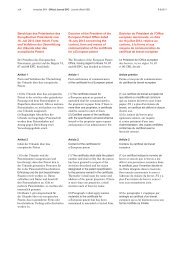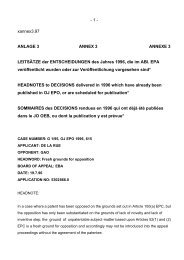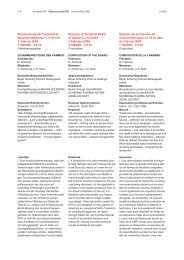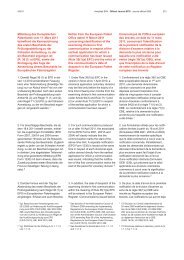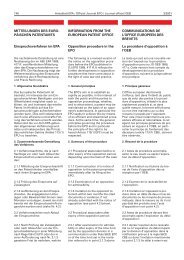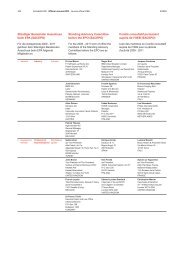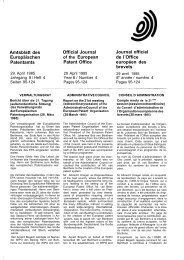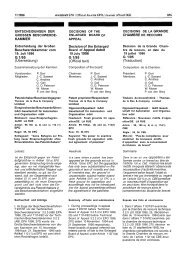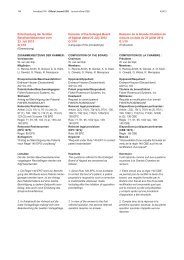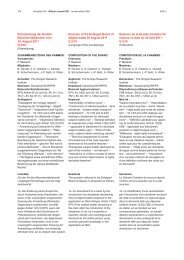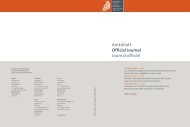Amtsblatt des Europäischen Patentamts - European Patent Office
Amtsblatt des Europäischen Patentamts - European Patent Office
Amtsblatt des Europäischen Patentamts - European Patent Office
Create successful ePaper yourself
Turn your PDF publications into a flip-book with our unique Google optimized e-Paper software.
(4) Je nach dem Wahlbezirk werden die<br />
ordentlichen Mitglieder <strong>des</strong> Rates und die<br />
stellvertretenden Mitglieder von allen<br />
Wahlberechtigten gemeinsam oder je zur<br />
Hälfte von den Wahlberechtigten, die freiberuflich<br />
tätig sind, und von den Wahlberechtigten,<br />
die anderweitig tätig sind, gewählt.<br />
(5) Wahlbezirke mit einer einheitlichen<br />
Wählerschaft sind Liechtenstein, Monaco,<br />
die Niederlande, Irland und das Vereinigte<br />
Königreich.<br />
(6) Ein Wahlbezirk mit nichteinheitlicher<br />
Wählerschaft kann das Wahlverfahren<br />
wechseln, wenn sich die Mehrheit der freiberuflich<br />
tätigen Wahlberechtigten und die<br />
Mehrheit der anderweitig tätigen Wahlberechtigten<br />
dafür aussprechen. Ein Wahlbezirk<br />
mit einheitlicher Wählerschaft kann<br />
das andere Wahlverfahren annehmen,<br />
wenn sich die Mehrheit der freiberuflich tätigen<br />
Wahlberechtigten oder die Mehrheit<br />
der anderweitig tätigen Wahlberechtigten<br />
dafür ausspricht. Der Rat führt zu diesem<br />
Zweck eine Abstimmung durch, wenn<br />
min<strong>des</strong>tens 10 Wahlberechtigte der einen<br />
oder anderen Gruppe oder die Hälfte der<br />
Wahlberechtigten einer Gruppe, deren<br />
Zahl weniger als 20 beträgt, einen entsprechenden<br />
Antrag stellen.<br />
(7) Bei jeder Wahl in einem Wahlbezirk mit<br />
nichteinheitlicher Wählerschaft erklären<br />
die Wahlberechtigten, auf welche Art sie<br />
ihre Tätigkeit ausüben.<br />
(8) Der Rat trifft die notwendigen Vorkehrungen<br />
für die Wahl; er ermöglicht insbesondere<br />
die Briefwahl.<br />
Artikel 8<br />
Tagungen <strong>des</strong> Rates<br />
(1) Der Rat tritt so oft zusammen, wie er<br />
dies für erforderlich erachtet, min<strong>des</strong>tens<br />
jedoch einmal im Jahr. Er hat den Institutsmitgliedern<br />
jährlich einen Bericht vorzulegen<br />
und Rechnung zu legen.<br />
(2) Bei jeder Wahl <strong>des</strong> Rates wählt dieser<br />
aus seinen ordentlichen Mitgliedern einen<br />
Präsidenten, zwei Vizepräsidenten, einen<br />
Generalsekretär und einen Schatzmeister.<br />
Die Ämter <strong>des</strong> Präsidenten und der Vizepräsidenten<br />
dürfen ununterbrochen jeweils<br />
höchstens für zwei aufeinanderfolgende<br />
Amtszeiten ausgeübt werden. Jedoch<br />
dürfen beide Ämter nicht länger als<br />
für insgesamt drei aufeinanderfolgende<br />
Amtszeiten ausgeübt werden.<br />
Artikel 9<br />
Befugnisse <strong>des</strong> Rates<br />
(1) Dem Rat obliegt die Verwaltung und<br />
die Leitung der Geschäfte <strong>des</strong> Instituts.<br />
(2) Der Rat erläßt die erforderlichen Regelungen<br />
für die Tätigkeiten <strong>des</strong> Instituts sowie<br />
seiner Einrichtungen und nachgeordneten<br />
Stellen.<br />
elected by the votes of all the electors in<br />
the constituency taken together, or as to<br />
one half shall be elected by electors engaged<br />
in private practice and as to the<br />
other half by electors engaged in any other<br />
capacity.<br />
(5) Constituencies with a unitary electorate<br />
shall be those of Liechtenstein,<br />
Monaco, the Netherlands, Ireland and the<br />
United Kingdom.<br />
(6) A constituency with a non-unitary electorate<br />
may adopt the other method of voting<br />
if a majority of the electors engaged in<br />
private practice and a majority of the electors<br />
otherwise engaged so decide. A constituency<br />
with a unitary electorate may<br />
adopt the other method of voting if a majority<br />
of the electors engaged in private<br />
practice or a majority of the electors<br />
otherwise engaged so decide. The Council<br />
shall organise a vote for this purpose if<br />
called upon to do so by at least ten electors<br />
in either category, or one half of the electors<br />
of a category if there are less than<br />
twenty.<br />
(7) In each election in a constituency with<br />
a non-unitary electorate electors shall<br />
state the capacity in which they are engaged<br />
in their profession.<br />
(8) The Council shall take the necessary<br />
measures to provide for elections and in<br />
particular for voting by post.<br />
Article 8<br />
Meetings of the Council<br />
(1) The Council shall meet as often as it<br />
considers necessary, and in any event at<br />
least once a year. It shall submit a report<br />
and accounts to the members of the Institute<br />
every year.<br />
(2) On each election of the Council, it shall<br />
elect from among its members a President,<br />
two Vice-Presidents, a Secretary-General<br />
and a Treasurer. The offices of President<br />
and Vice-President may each be held for a<br />
maximum of two consecutive terms. However,<br />
the two offices may not be held for<br />
more than a total of three consecutive<br />
terms.<br />
Article 9<br />
Powers of the Council<br />
(1) The Council shall have the management<br />
and control of the affairs of the Institute.<br />
(2) The Council shall have power to make<br />
regulations governing the conduct of the<br />
business of the Institute and its constituent<br />
and any subsidiary bodies.<br />
suppléants sont élus par l´ensemble <strong>des</strong><br />
électeurs, ou pour moitié par ceux qui<br />
exercent dans le cadre de la profession libérale<br />
et pour moitié par ceux qui exercent<br />
à tout autre titre.<br />
(5) Les circonscriptions à collège unique<br />
sont celles du Liechtenstein, de Monaco,<br />
<strong>des</strong> Pays-Bas, de I´lrlande et du Royaume-Uni.<br />
(6) Une circonscription à double collège<br />
peut adopter le système du collège unique<br />
si la majorité <strong>des</strong> électeurs exerçant dans<br />
le cadre de la profession libérale et la majorité<br />
<strong>des</strong> électeurs exerçant à un autre<br />
titre se prononcent dans ce sens. Une circonscription<br />
à collège unique peut adopter<br />
le système du double collège si la majorité<br />
<strong>des</strong> électeurs exerçant dans le cadre de la<br />
profession libérale ou la majorité <strong>des</strong> électeurs<br />
exerçant à un autre titre se prononcent<br />
dans ce sens. Un vote est organisé à<br />
cet effet par le Conseil lorsque dix électeurs<br />
au moins de l´une ou de l´autre catégorie,<br />
ou la moitié <strong>des</strong> électeurs d´une catégorie<br />
s´ils sont moins de vingt, en font la<br />
demande.<br />
(7) Lors de chaque élection dans une circonscription<br />
à double collège, tout électeur<br />
précise à quel titre il exerce sa profession.<br />
(8) Le Conseil prend toutes dispositions<br />
utiles à l´organisation <strong>des</strong> élections et notamment<br />
pour permettre le vote par correspondance.<br />
Article 8<br />
Réunions du Conseil<br />
(1) Le Conseil se réunit aussi souvent qu´il<br />
le juge nécessaire et, en tout cas, au moins<br />
une fois par an. Il soumet chaque année un<br />
rapport et <strong>des</strong> comptes aux membres de<br />
I´Institut.<br />
(2) A chaque élection du Conseil, ce dernier<br />
élit parmi ses membres un président,<br />
deux vice-présidents, un secrétaire général<br />
et un trésorier. Les fonctions de président<br />
et de vice-président ne peuvent pas<br />
donner lieu chacune à plus de deux mandats<br />
consécutifs. Toutefois, les deux fonctions<br />
peuvent être exercées successivement<br />
pendant trois mandats consécutifs.<br />
Article 9<br />
Pouvoirs du Conseil<br />
(1) Le Conseil est chargé de l´administration<br />
et de la gestion <strong>des</strong> activités de I´Institut.<br />
(2) Le Conseil arrête les règlements nécessaires<br />
au fonctionnement de I´Institut et<br />
de tous les organes qui le composent ou<br />
qui en dépendent.



